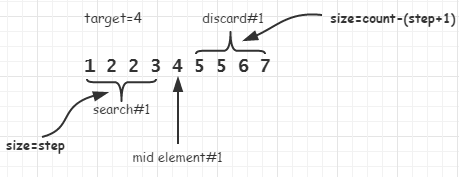C++ STL:lower_bound与upper_bound实现
lower_bound
lower_bound(begin, end, target)用来查找一个已排序的序列中[begin, end)第一个大于等于target的元素index。数组A如下:
value: 1, 2, 2, 3, 4, 5, 5, 6, 7
index: 0, 1, 2, 3, 4, 5, 6, 7, 8
这样的一个序列,如果查找5的lower_bound,返回的应该是第一个5即A[5]。下面是摘自cplusplus.com上的lower_bound代码
template <class ForwardIterator, class T> ForwardIterator lower_bound (ForwardIterator first, ForwardIterator last, const T& val) { ForwardIterator it; iterator_traits<ForwardIterator>::difference_type count, step; count = distance(first,last); while (count>0) { it = first; step=count/2; advance (it,step); if (*it < val) { // or: if (comp(*it,val)), for version (2) first = ++it; count -= step+1; } else count = step; } return first; }
如果搜索对象只是数组的话还可以再简化一点:
count = last - start; while (count > 0) { step = count/2; int* it = first + step; if (*it < target) { count = count - (step + 1); first = it + 1; } else { count=step; } } return first;

基本情况: 当输入只有一个元素时,而该元素不是要查找的元素时返回last,即该元素的后一个位置
case: target=4
当在上图中的数组中找4的lower_bound时,第一次*it取到的值是4,因为这不是简单的二分搜索,而是要返回第一大于等于查找元素的位置,所以搜索不能在此时结束。但是可以确定5~7这一部分可以不用搜索了,因为当前至少有一个元素即*it是大于等于4了,因而缩小查找范围(count=step)。这个查找范围并不包括已找到的4,为什么是这样?分情况讨论:
1. 当前面的这个范围没有符合条件的数时,就会将范围最后的位置的后一位置返回,而此位置正好是4所在的位置(*it>= target时it所在的位置,它是符合查找条件的),其正好是lower_bound。
2. 当前面的这个方位含有符合条件的数时,此时当前的这个4就不是lower_bound,真正的lower_bound会在该区间内产生
case: target=5
当求5的lower_bound时,第一次找到中间元素时4,4<5,所以4和4前面的所有都不会含有5的lower_bound,因而下一次搜索只会在5~7这个区间进行,这个就和一个全新的问题一样了。
upper_bound
upper_bound用来在[begin, end)中找到第一个大于target的index
template <class ForwardIterator, class T> ForwardIterator upper_bound (ForwardIterator first, ForwardIterator last, const T& val) { ForwardIterator it; iterator_traits<ForwardIterator>::difference_type count, step; count = std::distance(first,last); while (count>0) { it = first; step=count/2; std::advance (it,step); if (!(val<*it)) // or: if (!comp(val,*it)), for version (2) { first=++it; count-=step+1; } else count=step; } return first; }
简化版本:
lower_bound:
1 int lo = 0, hi = n; 2 // lower_bound 3 while (lo < hi) { 4 int mid = (lo + hi) / 2; 5 if (A[mid] < target) { 6 lo = mid + 1; 7 } else { 8 hi = mid; 9 } 10 } 11 12 return lo;
upper_bound:
lo = 0, hi = n; // upper_bound while (lo < hi) { int mid = (lo + hi) / 2; if (A[mid] <= target) { lo = mid + 1; } else { hi = mid; } } return lo;
就在判断条件上多了个等号